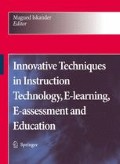Abstract
This research focused on the concept of Systems Design to Instruction on achieving the goals of universities at the undergraduate level. The study was occasioned by the slow integration of new methodologies in teaching and learning which focus on teacher centeredness. System Design to Instruction aims to integrate Information Communication Technologies [ICT] into teaching and learning. While the goals of the university are mainly to encourage life long learning, building interactive relationships with the immediate society and provide intelligent knowledge and distributed intelligence technology, the research aimed at the process of teaching and learning. The emphasis was on two sections: The Faculty of Computing and Information Technology and the School of Education. These two form the crux to fully integrating technology with pedagogy in the teaching-learning and research process at Makerere University.
The study was a cross sectional survey based on a total of 225 respondents, consisting of 100 third year students of Bachelor of Arts in Education and 125 third year students of Bachelor of Science in Computer Science. Data was collected mainly through closed ended and open ended questionnaires. The researcher also compared results of set categories of students in the two organs who were exposed to ICT. Raw data was later presented and analysed using descriptive statistics of frequency distribution in nature and Multiple Analysis of Co variance (MANCOVA.). It was observed that the significant dependent variables that affected the Bachelor of Science in Computer Science were: evaluation of student social setting, research in the internet and other related technologies, different learning methods, different forms of instruction in teaching and learning, administering regular exams and reviewing performance according to course objectives. On the other hand at the School of Education the following affected students: Any form of educational technology used, incorporation of modern methods in teaching and learning, evaluation of student social setting in learning and sufficient technological resources for teaching and research.
It was found out that the Systems Design to Instruction which is conceptualised using Analysis, Design, Development, Implementation and Evaluation [ADDIE] is important as it addressed the ever increasing needs of the students by leading to: increased learning, knowledge generation, response to learning problems and efficiency in teaching and learning. Having concluded in a nutshell that ADDIE leads to the attainment of university goals, the researcher recommended that for ADDIE to achieve goals at the undergraduate level there is need to lay emphasis on the learner in this process.
Access this chapter
Tax calculation will be finalised at checkout
Purchases are for personal use only
Preview
Unable to display preview. Download preview PDF.
References
E. M Amin, Social science research: Conception, methodology & analysis. Makerere University: Makerere University Printery, 2005.
E. M. Amin, Foundations of statistical inference for Social Science Research. Makerere University: Makerere University Printery, 2004.
C. J. Bonks and V. P. Dennen, Evaluating online learning: frame works and perspectives.Workshop held 17$th$ February 2002, United States, 2002.
M. Bower, A learning system engineering approach to developing online courses. Available http://crpit.com/confpapers/CRPITV52Bower.pdf, April 3, 2006.
D. Chirnside, A final report. Flexible learning leaders 2004-05, University of Waikato, Hamilton, New Zealand, 2005.
D. Clark 2000, Instructional system design concept map.Available: \\www.nwlink.com\donclark\hrd\. (March 3, 2005),
J. Duderstadt, 1999. The future of higher education, new roles for the 21st-century university. Issues in Science and Technology Online- Winter 1999. Available: http://www.schwartzman.org.br/simon/21 century.htm (January 26, 2007)
D. Ensminger, D. Surry, B. Porter and D. Wright. Factors Contributing to the Successful Implementation of Technology Innovations. Educational Technology&Society, 7 (3), 61-72. University of South Alabama, College of Education, USA, 2004.
M. Gonzalez and M. Vilas. Advances in technology-based education: towards a knowledge based society. Proceedings of the II Interna tional Conference on Multimedia and Information&Communication Technologies in Education. Consejería de Educación, Ciencia y Tecno logía, Badajoz, Spain, 2003.
A.W.M. Hoogveld and F. Paas. The teacher as designer: experimental web based training of teachers in an Instructional Systems Design approach. Educational Technology Expertise Centre, Open University of the Netherlands. Paper for the BITE 2001 Conference, November 22-24, 2001. Technical University of Eindhoven, Eindhoven, Netherlands, 2001.
Makerere University ICT Policy Master Plan 2, (2004a), Information and communication technology: Master plan phase 2 (2005 – 2009), (ICT Services and Systems; Management, Control and Maintenance; Master Plan). Makerere University 99$th$ Council Meeting, Kampala, Uganda, 2004.
B. Mergel, Instructional design and learning theory. Educational Communications Technology, University of Saskatchewan, (1998)
M. Stiles and J. Yorke, Designing and implementing learning technology projects – a planned approach. A paper presented at the Em bedding Learning Technologies Seminar , Staffordshire University, 8th April 2003.
UNESCO, Global education digest 2005: comparing education statistics across the World, UNESCO Institute for Statistics, Montreal (p.94), 2005.
I. Visscher-Voerman and K. L. Gustafson. Paradigms in the theory and practice of education and training design. Education Theory Re search and Design Journal, Volume 52, No.2, Korea. Available http://education.korea.ac.kr/.../ Instructional_Design/ para digms in education and training design.pdf. (April 12, 2006)
World Bank,2002, Constructing knowledge societies: new challenges for tertiary education: The International Bank for Reconstruction and Development. Washington, DC. Available: www.worldbank.org (October 25, 2005)
Author information
Authors and Affiliations
Editor information
Editors and Affiliations
Rights and permissions
Copyright information
© 2008 Springer Science+Business Media B.V.
About this paper
Cite this paper
Kirigha, A., Neema-Abooki, D. (2008). Systemic Design of Instruction On Achieving The Goals of Undergraduate Level Education in Universities: A Case Study of Makerere University. In: Iskander, M. (eds) Innovative Techniques in Instruction Technology, E-learning, E-assessment, and Education. Springer, Dordrecht. https://doi.org/10.1007/978-1-4020-8739-4_7
Download citation
DOI: https://doi.org/10.1007/978-1-4020-8739-4_7
Publisher Name: Springer, Dordrecht
Print ISBN: 978-1-4020-8738-7
Online ISBN: 978-1-4020-8739-4
eBook Packages: Computer ScienceComputer Science (R0)

